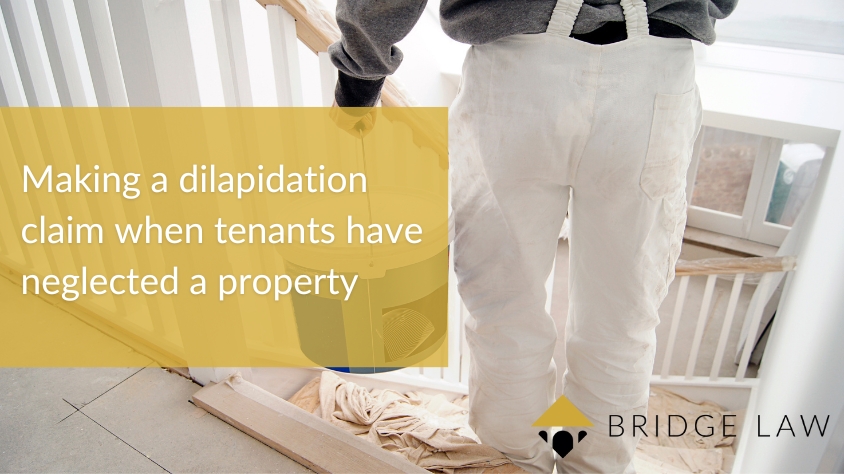Making a dilapidation claim when tenants have neglected a property

Dilapidations is a specific area of the law which refers to rental properties, both residential and commercial, that are in disrepair. It’s an area of the law both landlords and tenants should be aware of. In this blog, we’ve explained the purpose of dilapidation claims and what landlords should do if they wish to make a claim.
Why do landlords put forward a dilapidation claim if a property has been left in disrepair?
In most cases, landlords have to allow tenants to leave a certain level of ‘fair wear and tear’ in their property. However, in many situations, tenants neglect to maintain a property appropriately, as stated in the lease or supporting documents, or cause damage to the property beyond what is deemed ‘fair wear and tear’.
In these situations, a landlord may put forward a claim for dilapidations. The purpose of dilapidations claims isn’t to profit landlords by making properties as good as new, but to enable landlords to return the property to the position it should be in if the tenant hadn’t breached their obligations set out in their lease to maintain and repair the property.
Time limit to putting forward a claim
It’s important that the situation is assessed as early as possible at the end of the lease term and claims submitted include all relevant facts and supporting documents.
The Pre-Action-Protocol for submitting claims for damages or breaches of a tenants obligation to repair at the end of a lease term suggests that a Schedule of Dilapidations, outlining the issues is to be put forward to the tenant within a 56-day time limit – giving the tenant a further 56 days to respond.
Steps to take to help bring a successful dilapidation claim
There are certain steps landlords should take prior to and at the start of the tenancy to help protect themselves from losing out if tenants do cause damage to their properties. If all appropriate steps are taken, it should be clear whether a tenant has breached their obligations and if they can put forward a dilapidations claim.
These steps include:
- Ensuring clauses in the lease agreement are carefully written, to make it clear the tenant has an obligation to repair, redecorate or to reinstate the property to its previous state if restricted damage or alterations have been made to the property.
- Ensure any covenants in supplemental documentation supporting the lease agreement is reviewed carefully and make sure it is worded clearly and the tenant is clear on the exact extent of their obligations.
- Create a Schedule of Condition including photographs and written descriptions.
We always recommend you seek professional legal advice regarding your tenancy agreements and supporting documents before asking a new tenant to sign their lease agreement – to help make sure you have properly covered all bases and are as protected as possible. Having all the above in place and carefully worded can mean you are more likely to have a successful dilapidations claim if the tenant has breached their clearly set out obligations – and you have proof the condition of the property is not what you expect it to be.
If you believe you have a right to make a dilapidations claim, you should gain legal advice to evaluate the situation and your position, to understand the likelihood of success with your particular claim and what you need to do.
What Landlords and Tenants should do to avoid dilapidations claims
Both Landlords and Tenants should fully understand the details of the lease agreement and supporting documents before signing, and if there is any doubt on exactly what the tenants obligations are, it’s recommended you seek advice to gain clarity.
Understanding and being aware of the obligations up front is helpful in tenants knowing what they need to do and can avoid losing deposits or having claims made at the end of the agreement.
If you need advice on a dilapidations claim or any other residential or commercial landlord and tenant matter, speak to our specialist property litigation team on 0161 427 0084 (Marple Bride) or 01484 442 700 (Holmfirth).
Written by Jonathan Cass

